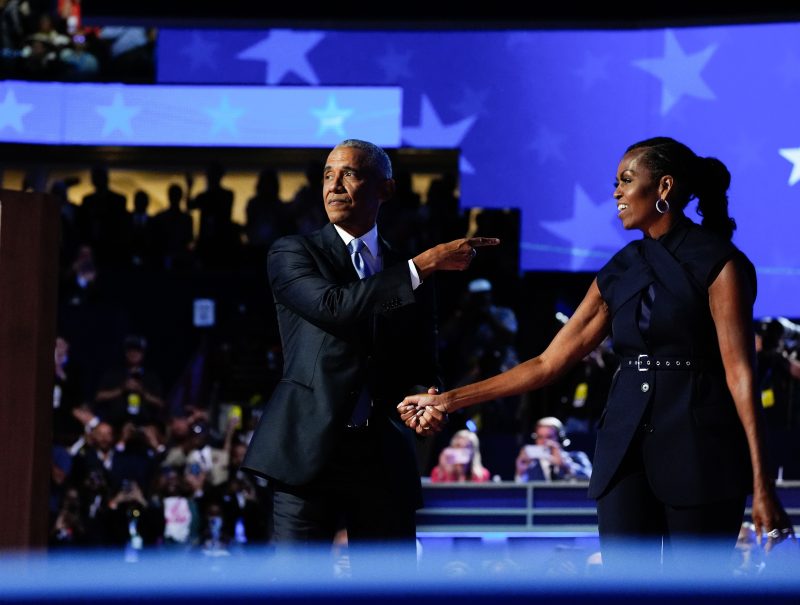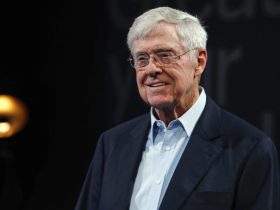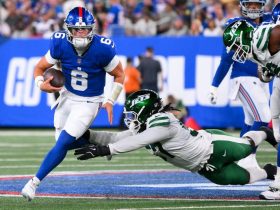CHICAGO — Former president Barack Obama and former first lady Michelle Obama, two of the Democratic Party’s most popular figures, electrified delegates at the party’s convention Tuesday, saying they saw the same sense of excitement and hope that characterized their own rise to the White House now surrounding Kamala Harris.
“I’m feeling hopeful because this convention has always been pretty good to kids with funny names who believe in a country where anything is possible,” Barack Obama said, a reference to his emergence as a political star at the 2004 convention. “Because we have the chance to elect someone who’s spent her whole life trying to give people the same chances America gave her.”
The former president sought to frame the election as a stark choice.
“We don’t need four more years of bluster and chaos. We’ve seen that movie — and we all know that the sequel’s usually worse,” he said. “America is ready for a new chapter. America’s ready for a better story. We are ready for a President Kamala Harris.”
In her remarks, Michelle Obama delivered a similar message. “America, hope is making a comeback,” she declared.
The former first lady — whose appearance was greeted with particular emotion, even prompting some delegates to cry — also took on Republicans who have disparaged Harris as incompetent, calling her “one of the most qualified people ever to seek the office of the presidency.” And she needled Trump over a recent comment that undocumented immigrants are taking “Black jobs.”
“Who’s going to tell him that the job he’s currently seeking might just be one of those Black jobs?” she said.
In the choreography of the convention, the Obamas played the role of charismatic figures charged with inspiring those at the Democrats’ gathering and beyond to power Harris to victory in the two months remaining before Election Day. Monday featured an emotional tribute to outgoing president Joe Biden, Wednesday will be headlined by vice-presidential nominee Tim Walz, and on Thursday the convention will culminate with Harris’s acceptance speech.
Before the Obamas spoke, the delegates held a roll-call vote for Harris on the convention floor — a colorful, if ceremonial, ritual that reaffirmed Harris’s official nomination, which had taken place in a virtual vote earlier this month.
Harris was then beamed in to greet the Chicago delegates from a rally she was holding in Milwaukee, as she addressed cheering crowds in both cities at once.
“I thank everyone there and here,” Harris said. “This is a people-powered campaign, and together we will chart a new way forward.”
She added, “I’ll see you in two days, Chicago.”
In his remarks, Obama also saluted Biden’s tenure and his accomplishments. The two men have a complicated relationship, one that evolved from a marriage of political convenience in 2008 to a bond shaped by political triumphs and the loss of Biden’s son Beau. “History will remember Joe Biden as a president who defended democracy at a moment of great danger,” Obama said. “I am proud to call him my president, but even prouder to call him my friend.”
Obama selected Biden as his running mate because of his foreign policy expertise and Washington experience, offsetting Obama’s perceived political weaknesses. In the process, he elevated the longtime senator to a new political stature, setting the stage for Biden’s own presidential run in 2020.
Biden and his closest aides, however, have long been frustrated by Obama’s skepticism of Biden’s political prospects, a dispute that dates to the end of Obama’s presidency and that resurfaced in dramatic fashion in recent weeks.
When Biden considered entering the 2016 presidential race, Obama made clear to aides that he believed Hillary Clinton should be the Democratic nominee instead. Obama even dispatched David Plouffe, one of his top political strategists, to reiterate for Biden the long odds he faced if he decided to run. (Plouffe has since joined the Harris campaign as a senior adviser.)
More recently, in the aftermath of Biden’s politically disastrous debate against Trump on June 27, when the president sometimes struggled to complete his thoughts and finish sentences, Obama told allies that Biden needed to seriously consider the viability of his candidacy, irking some of Biden’s closest aides, who thought Obama should have been more supportive — publicly and privately.
While the Obamas were clearly Tuesday’s emotional high point for many delegates, several other speakers also rallied the party. In his remarks, Doug Emhoff, the second gentleman, shared details of his upbringing and his courtship with Harris. Filling a role often ascribed to spouses of political candidates, Emhoff also sought to share a more personal side of Harris and to humanize her.
He talked about the love that Harris, his second wife, has shown to his children and the way the two of them have worked to care for their blended family.
“She comes to synagogue with me for High Holiday services, and I go to church with her for Easter,” he said. “I get to enjoy her mom’s chile relleno recipe every Christmas, and she makes a mean brisket for Passover that brings me right back to my grandmother’s apartment in Brooklyn.”
Emhoff has been elevated to a novel role as potentially the first male spouse of a president. He has also become a leading advocate against antisemitism at a time when attacks on Jews, as well as Muslims, have been rising amid the war in Gaza.
“Kamala has fought against antisemitism and all forms of hate her whole career,” he said. “And she encouraged me, as second gentleman, to take up that fight — which is so personal to me.”
While the convention was underway Tuesday, Harris and Walz were about 90 miles north in Milwaukee for their rally at the Fiserv Forum, the same arena where Republicans gathered last month for their own convention. It was during that rally that the delegates in Chicago held their ceremonial roll call, complete with a DJ and special effects. It began with Delaware — a tribute to Biden — and concluded with California, Harris’s home.
Convention organizers also brought several Republican officials onstage as part of an effort to highlight how Trump’s third campaign continues to splinter his party.
Stephanie Grisham, who worked in the Trump White House before resigning on Jan. 6, 2021, also spoke Tuesday night. Grisham said she had been more than “just a Trump supporter”; she was “a true believer” and “one of his closest advisers.”
“When I was press secretary, I got skewered for never holding a White House briefing,” she said. “It’s because, unlike my boss, I never wanted to stand at that podium and lie. Now, here I am: behind a podium, advocating for a Democrat. Because I love my country more than my party. Kamala Harris tells the truth. She respects the American people. And she has my vote.”
In his remarks, John Giles, the Republican mayor of Mesa, Ariz., assailed Trump and urged Americans “in the political middle” to support Harris.
“Our Grand Old Party has been kidnapped by extremists and devolved into a cult,” he said. “The cult of Donald Trump. Trump doesn’t know the first thing about public service. Like a child, he acts purely out of self-interest.”
Trump, meanwhile, continued his pattern of holding a campaign event every day of the Democratic convention with remarks at a sheriff’s office in Howell, Mich. He falsely accused Harris of orchestrating a “vicious, violent overthrow” by replacing Biden at the top of the Democratic ticket.
Trump went on to defend those who assaulted the U.S. Capitol on Jan. 6, 2021, wrongly claiming that “nobody was killed.” Four people died in the attack, three from medical problems and one who was shot by a police officer. One officer who fought the mob died of a stroke the next day, and four more officers died by suicide in the days and months that followed.
In Chicago, where Democrats have largely been united since Biden dropped out of the race, a rare mention of one of the biggest fissures in the party — the war in Gaza — came from Sen. Bernie Sanders (I-Vt.), though only briefly.
“We must summon the courage to stand up to wealth and power and deliver justice for people at home and abroad,” Sanders said in his remarks from the stage. “We must end this horrific war in Gaza, bring home the hostages and demand an immediate cease-fire.”
But in the end, it was a night highlighted by a one-two punch from the Obamas, who both delivered blistering takedowns of Trump, defining the election as a fight over the essence of America.
“That’s the America Kamala Harris and Tim Walz believe in — an America where ‘we the people’ means everyone,” Barack Obama said.
And Michelle Obama concluded: “No one has a monopoly on what it means to be an American. No one.”
She added, “Kamala has shown her allegiance to this nation — not by spewing anger and bitterness, but by devoting her life to service.”








